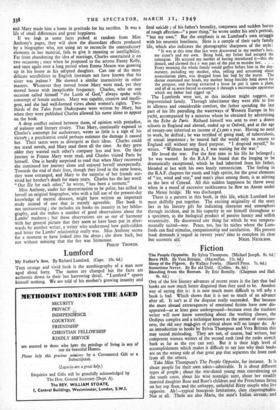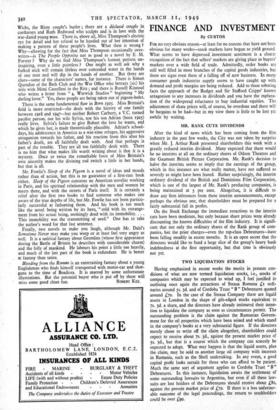Fiction
Sleep of the Pigeon. By Wallace Fowlie. (Harvill Press. 7s. 6d.) Sometime Never. By Ro ald Dahl. (Collins. 8s. 6d.) ONE of the few literary advances of recent years is the fact that bad books are now much better disguised than they used to be. Another way of saying this is : it is now much more difficult to tell why a book is bad. Which shows that it is not so much of an advance after all. It isn't as if the disguise really succeeded. But because the more absurd extravagances of emotional fiction have now dis- appeared—or at least gone underground—because even the trashiest writer will now know something about the working classes, the Oedipus complex and a technique known as the stream of conscious- ness, the old easy mtja.,pies of critical abuse will no longer do. As an introduction to books by Sylvia Thompson and Vera Brittain this may sound misleading. They are not, of course, bad writers, but competent women writers of the second rank (and the ranks stret:h back as far as the eye can see). But it is their high level of accomplishment which makes it difficult to say just why their books are on the wrong side of that great gap that separates the front rank from all the others.
Take Miss Thompson's The People Opposite, for instance. It is about people for their own sakes—admirable. It is about different types of people ; about the war-dazed young man convalescing on the south coast, about his wise nostalgic aunt, about her steadily married daughter Rose and Rose's children and the Frenchman living on her top floor, and the unhappy, unfaithful Ritzy couple who live opposite. Ah!—typical bourgeois limitations, class claustrophobia. Not at all. There are also Maria, the aunt's Italian servant, and
Wicks, the Ritzy couple's butler ; there are a déclassé couple in corduroys and Ruth Redwood who sculpts and is in love with the war-dazed young ratan. There is, above all, Miss Thompson's electric eye for detail and her refusal to be hustled out of her intention of making a pattern of these people's lives. What then is wrong ? Why—allowing for the fact that Miss Thompson occasionally over- writes—is The People Opposite not as good as a novel by E. M. Forster ? Why do we find Miss Thompson's human pattern un- inspiring, even a little pointless ? One might as well ask why a forked stick will remain lifeless over concealed water in the hands of one man and will dip in the hands of another. But there are clues—some of the characters' names, for instance. There is Simon Quendon of the Bath Club and the War Office who betrays (sic) his wife with Mimi Castellani in the Ritz ; and there is Russell Kinnoul who writes a letter from " 4, Warwick Studios " beginning " My darling lover." Yes, these people are being taken out of pigeon-holes.
There is the same fundamental flaw in Born 1925. Miss Brittain's field is more restricted—she deals with the history of one family between 1918 and 1947—but neither Robert Carbury, a V.C. turned pacifist parson, nor his wife Sylvia, nor his son Adrian (born 1925) really lives. Sylvia's failure to give Robert the love he wants, and which he gives her, is made theoretically plausible. Adrian's school- days, his adolescence in America as a war-time refugee, his aggressive antagonism towards his father, and his reaction from this after his father's death, are all faithfully dealt with. And that perhaps is part of the trouble. They are all too faithfully dealt with. There is no hint that what makes life worth writing about is that it is a mystery. Once or twice the remarkable force of Miss Brittain's own sincerity makes the divining rod twitch a little in her hands, but that is all.
Mr. Fowlie's Sleep of the Pigeon is a novel of ideas and moods rather than of action, but this is no guarantee of a first-rate book either. Sleep of the Pigeon concerns an American novelist working in Paris, and his spiritual relationship with the men and women he meets there, and with the streets of Paris itself. It is certainly a relief after the first two books to find someone who makes one aware of the true depths of life, but Mr. Fowlie has not been particu- larly successful at fathoming them. And his book is too much like the novel being written by its hero, "cold with its estrange- ment from his actual being, seemingly dead with its immobility. . . . This immobility was the transmitting of seed." One has to take the author's word for that last sentence.
Finally, two novels to make you laugh, although Mr. Dahl's Sometime Never may make you weep or at least feel .very angry as well. It is a satirical fantasy about Gremlins (whose first appearance during the Battle of Britain he describes with considerable charm) and the folly of mankind. He labours his point a little too heavily, and much of the last part of the book is redundant. He is better at fantasy than satire.
Bleeding from the Roman is an entertaining fantasy about a young Englishman who finds himself transported with motor-car and shot- guns to the time of Boadicea. It is marred by some unfortunate illustrations. But the potential buyer who is put off by these will







































 Previous page
Previous page